
Androgens: Breaking Down the DUTCH Test
In this module on androgen breakdown in the DUTCH test, you'll learn to meticulously review androgen metabolism results to make informed treatment decisions. Androgen levels and their metabolites can reveal critical insights into hormonal imbalances, but interpreting these results requires an eye for detail. This module will guide you through the nuances of androgen breakdown, ensuring you understand the significance of each marker and how variations can impact your treatment approach. By carefully analyzing these results, you’ll be able to tailor your recommendations with precision, leading to more effective and personalized patient care. Mastering this aspect of hormone testing will enhance your ability to address underlying issues and optimize treatment outcomes. “The Board for Certification of Nutrition Specialists℠ designates this activity for a maximum of 1.25 continuing education credits for Certified Nutrition Specialist®.
- Course
- By Katie Morra
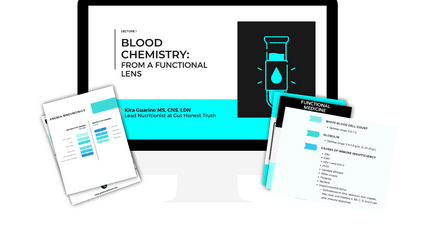
Blood Chemistry From a Functional Lens
Every client that walks through your door has a long history of blood labs, and now you don't have to constantly search for the WHYs behind their imbalances because we've done that work for you. This course is designed to help you effortlessly identify key patterns in blood work, uncover the root causes of health issues, and deepen your knowledge with practical tools. You'll gain the confidence to analyze your patients' health with precision, making informed decisions that truly support their path to wellness—all while expanding your healing toolkit with ease. “The Board for Certification of Nutrition Specialists℠ designates this activity for a maximum of 1.25 continuing education credits for Certified Nutrition Specialist®.
- Course
- By Katie Morra
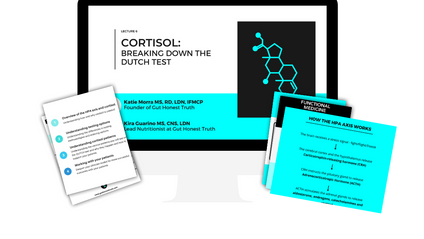
Cortisol: Breaking Down the DUTCH Test
In this module, you’ll navigate the complexities of cortisol metabolism and address common misunderstandings surrounding this crucial hormone. Cortisol testing can be challenging due to the variety of ways cortisol production can be disrupted, and misconceptions can lead to incorrect interpretations and treatment plans. This module will equip you with the skills to accurately differentiate between various cortisol production discrepancies. You’ll learn to apply the best strategies to support your patients effectively, ensuring that your treatment plans are based on a precise understanding of their cortisol levels and overall adrenal health. By mastering these concepts, you’ll be able to offer more targeted and effective care, ultimately helping your patients achieve better outcomes and balanced hormonal health. “The Board for Certification of Nutrition Specialists℠ designates this activity for a maximum of 1.25 continuing education credits for Certified Nutrition Specialist®.
- Course
- By Katie Morra

Detox 101: Environmental Toxins
In this module on detoxification, you'll delve into the intricate physiology behind the body's detoxification processes and understand why supporting these systems is crucial for optimal health and disease prevention. You'll explore how the liver, kidneys, and other organs work together to eliminate toxins and the impact of various factors that can disrupt these natural processes. You’ll learn how to assess and support detoxification capacity and identify potential bottlenecks or dysfunctions. By mastering these concepts, you’ll be well-equipped to develop targeted, evidence-based protocols that support and optimize your patients’ detoxification systems, ultimately contributing to their overall health and well-being. “The Board for Certification of Nutrition Specialists℠ designates this activity for a maximum of 1.25 continuing education credits for Certified Nutrition Specialist®.
- Course
- By Katie Morra

Estrogen: Breaking Down the DUTCH Test
In this module on estrogen analysis using the DUTCH test, you will gain a comprehensive understanding of how to interpret estrogen levels and their impact on overall hormonal health. You will delve into the intricacies of estrogen metabolism, learning to differentiate between various estrogen metabolites and understanding how imbalances can influence health. The module will also clarify when and how to incorporate specific herbal approaches into your treatment plans, ensuring that you use these remedies in a way that is both safe and effective. By mastering these concepts, you will be equipped to make informed recommendations that go beyond generic solutions, offering personalized, evidence-based strategies to help your patients achieve optimal hormonal balance and overall well-being. “The Board for Certification of Nutrition Specialists℠ designates this activity for a maximum of 1.25 continuing education credits for Certified Nutrition Specialist®.
- Course
- By Katie Morra

GHT Academy: Tier 1 Program July 2025
- Course
- By Katie Morra

GHT's Blood Chemistry Practitioner Guide
What's included in our 18 page guide: -Functional & conventional reference range -Clinical relevance -Reasons marker is high or low Lab marker: WBC with differential, RBC, Hemoglobin, Hematocrit, MCV, MCH, MCHC, Platelets, RDW, BUN, Creatinine, eGFR, Cystatin C, Sodium, Potassium, Chloride, Uric Acid, Protein, Albumin, Globulin, Bilirubin, Calcium, GGT, Alk Phosphatase, ALT, Lactic Acid, Cholesterol panel, Glucose panel, Homocysteine, Micronutrient panel, Thyroid and Sex Hormone Panel
- Digital file
- 1 file
- By Katie Morra

GHT's Gut Health Practitioner Guide
What's included in our 42 page guide: -5R Protocol Template -Comparison of H pylori testing methodologies -Stomach acid testing protocol -IBS Sure/IBS Smart lab guide -Stool and SIBO test instructions to share with your clients -GI Map lab guide -Dysbiosis treatment guide -SIBO treatment guide -H pylori treatment guide -Candida treatment guide -Parasite treatment guide -DIY Elemental diet treatment guide
- Digital file
- 1 file
- By Katie Morra

GHT's Hormone Practitioner Guide
What's included in our 46 page guide: -Cortisol, Androgens, Progesterone and Estrogen -Reasons marker may be high or low -3 Phases of estrogen metabolism -Aromatase -How to work with the DUTCH test specifically -Recommended supplements and dosing
- Digital file
- 1 file
- By Katie Morra

GHT's Mold & Metals Detox Practitioner Guide
What's included in our 24 page guide: -Phases of detoxification and how to support each -Testing for Heavy metals and where each come from -Testing both home and body for mycotoxins -Biomarkers to consider for mycotoxins and CIRS -The ABCs approach to treating mold exposure -What to do with Herximer reactions -Supplements and medications to enhance detoxification -Additional considerations
- Digital file
- 1 file
- By Katie Morra
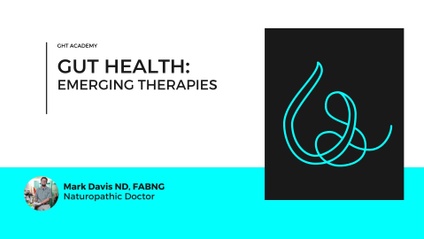
GI Emerging Therapies
- Course
- By Katie Morra
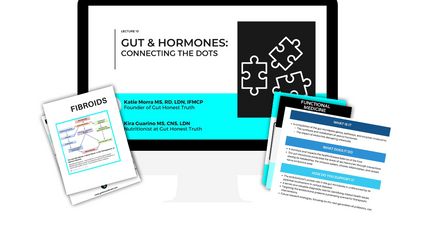
Gut & Hormones: Connecting the Dots
In this module on the gut-hormone connection, you'll uncover the critical and complex relationship between GI health and hormonal balance. This module will help you to see both the broad picture and the intricate details of this dynamic interplay and how a disruption in either system can have a profound impact on the other. To deepen your understanding, the module includes detailed case studies that illustrate real-world scenarios and help you apply theoretical knowledge to practical situations. By working through cases, you'll refine your skills in assessing and addressing gut and hormonal issues. This hands-on approach ensures that you can develop effective, personalized treatment plans that address both systems, ultimately supporting your patients' overall well-being and long-term health improvements. “The Board for Certification of Nutrition Specialists℠ designates this activity for a maximum of 1.25 continuing education credits for Certified Nutrition Specialist®.
- Course
- By Katie Morra
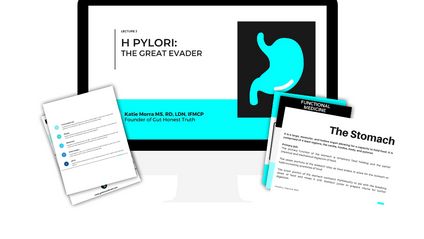
H pylori: the Great Evader
Helicobacter pylori is the most common gastrointestinal infection worldwide. Over 50% of the population carries this bacteria, which means at least half of the clients that walk through your door have it. In this module on H. pylori, you'll uncover how this often-overlooked bacterium is the missing piece of the puzzle in many health cases. H. pylori is extremely common and has far-reaching effects on various physiological systems, from digestive health to immune function, and its presence can be the driver of persistent health concerns for your clients. You'll learn why better managing and addressing H pylori is often the most effective starting point for treatment, allowing you to set the stage for lasting improvement in your patients' health. “The Board for Certification of Nutrition Specialists℠ designates this activity for a maximum of 1.25 continuing education credits for Certified Nutrition Specialist®.
- Course
- By Katie Morra
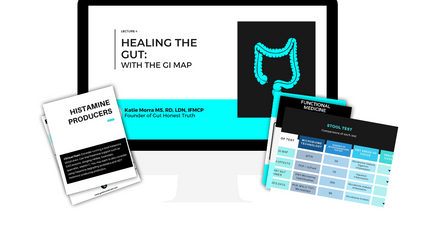
Healing with the GI Map
In this module you'll master the art of interpreting one of the most sought after stool tests to gain understanding of your patients' gut health. While the GI-MAP provides valuable insights into factors such as gut microbiota, digestive function, and potential pathogens, it’s crucial to remember that effective patient care involves more than just analyzing test results. You'll learn to integrate the data from the GI-MAP with a thorough evaluation of the patient's overall health, history, and symptoms. This approach ensures that you don’t rely solely on test results but instead develop nuanced, personalized treatment plans. Learn to craft precise and effective protocols that address each patient's unique needs and promote sustained gut health and overall well-being. “The Board for Certification of Nutrition Specialists℠ designates this activity for a maximum of 1.25 continuing education credits for Certified Nutrition Specialist®.
- Course
- By Katie Morra
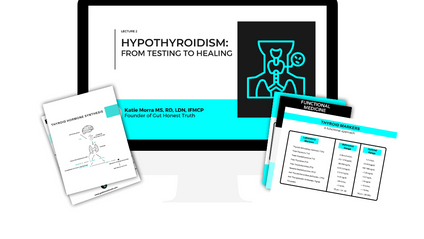
Hypothyroidism: From Testing to Healing
In this module, you'll dive deeper into thyroid health than ever before. You'll master the ability to identify lab patterns, recognize early signs of autoimmune development and the progression of thyrocyte destruction as well as make connections to root drivers of dysfunction. You'll also gain the skills to recognize when additional functional testing is necessary, and build a practical approach to managing and reducing antibody levels. With these insights, you'll gain the tools to effectively support your patients' health, empowering you to address the root causes of thyroid dysfunction and provide targeted, impactful care. This module will transform your approach to thyroid disorders, giving you the confidence to make a real difference in your patients' lives. “The Board for Certification of Nutrition Specialists℠ designates this activity for a maximum of 1.25 continuing education credits for Certified Nutrition Specialist®.
- Course
- By Katie Morra
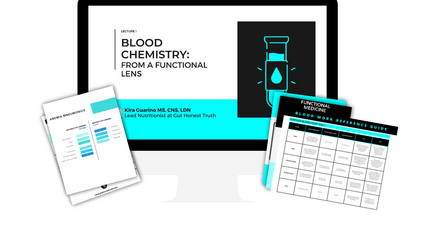
Mastering Blood Chemistry Bundle
PLUS Practitioner Guide
- Bundle
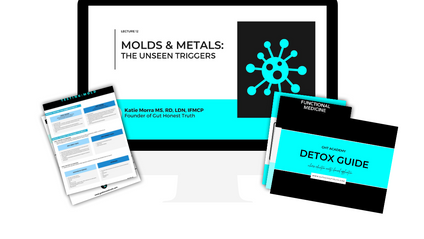
Mastering Detox Guide
PLUS Practitioner Guide
- Bundle
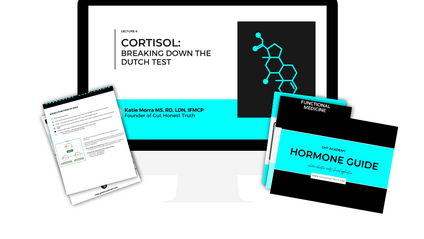
Mastering Sex Hormones Bundle
PLUS Practitioner Guide
- Bundle
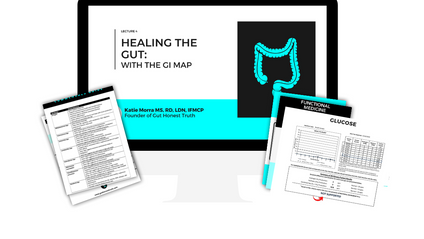
Mastering the Gut Bundle
PLUS Practitioner Guide
- Bundle
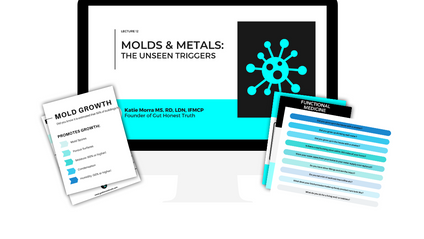
Molds & Metals: the Unseen Triggers
In this module, you’ll delve into the critical yet often hidden health issues of mycotoxin and heavy metal exposure and toxicity. You’ll explore the profound physiological effects of mold and heavy metals on the body, including their impact on immune function, inflammation, and various organ systems. This module will provide a thorough explanation of how to effectively manage mold exposure, including strategies for identifying mold-related health issues, implementing effective detoxification protocols, and mitigating ongoing risks of exposure. By understanding these processes in detail, you’ll be better equipped to help your patients reduce their toxic burden and achieve significant improvements in their health and well-being. “The Board for Certification of Nutrition Specialists℠ designates this activity for a maximum of 1.25 continuing education credits for Certified Nutrition Specialist®.
- Course
- By Katie Morra
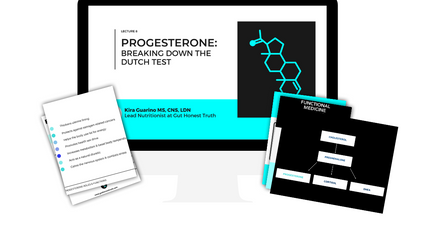
Progesterone: Breaking Down the DUTCH Test
In this module on progesterone analysis using the DUTCH test, you'll gain the expertise to scrutinize progesterone levels with precision, recognizing their crucial role in hormonal balance. Progesterone testing can reveal important information about a patient’s reproductive and overall hormonal health, but interpreting these results correctly is essential for making accurate treatment recommendations. This module will teach you to meticulously review progesterone levels and their metabolites, ensuring that you understand how fluctuations and imbalances affect your treatment strategies. By mastering the intricacies of progesterone testing, you’ll be equipped to develop targeted, effective protocols that address your patients' specific needs and enhance their overall well-being. “The Board for Certification of Nutrition Specialists℠ designates this activity for a maximum of 1.25 continuing education credits for Certified Nutrition Specialist®.
- Course
- By Katie Morra
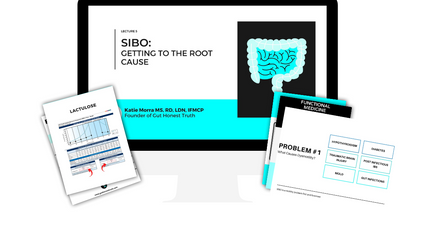
SIBO: Getting to the Root Cause
SIBO contributes to 60-80% of all IBS cases which means the odds are high that you will work with SIBO clients in your practice. In this module, you'll gain a deeper understanding that SIBO is actually a symptom rather than a fundamental cause of GI problems. You’ll learn to confidently identify the underlying factors that contribute to the recurrence of SIBO, whether they are related to gut motility, structural issues, or other underlying conditions. This module will equip you with a full spectrum of potential treatments and their applications, you'll be better prepared to tailor your approach to meet each patient’s unique needs. This module will not only help you manage SIBO effectively but also address the contributing factors, paving the way for sustained, long-term health improvements for your patients. “The Board for Certification of Nutrition Specialists℠ designates this activity for a maximum of 1.25 continuing education credits for Certified Nutrition Specialist®.
- Course
- By Katie Morra
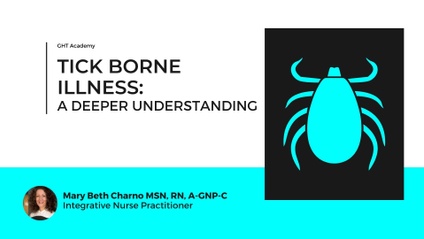
Tick Borne Illness from a Functional Medicine Perspective
- Course
- By Katie Morra